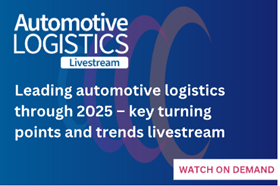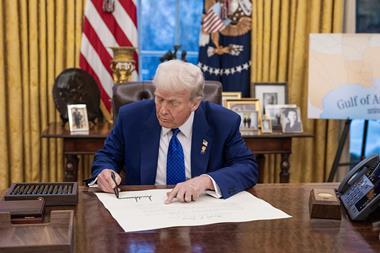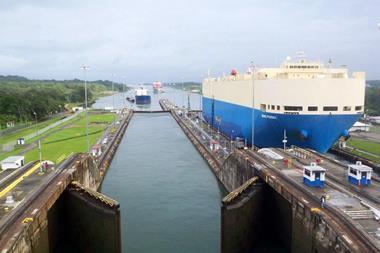[Updated February 11] Ford’s president, CEO and director James Farley used its Q4 earnings call last week to warn that any extended use of tariffs on automotive products from Canada and Mexico would have a huge adverse impact on the entire value system of the US automotive industry. He drove home the warnings at this week’s Wolfe Research Auto, Auto Tech and Semiconductor Conference in New York.

During Ford’s Q4 earnings call on February 5, its president, CEO and director James Farley said any prolonged US tariffs on imports from Canada and Mexico would have a devastating impact on the US automotive industry.
“There is no question that tariffs at 25% level from Canada and Mexico, if they’re protracted, would have a huge impact on our industry, with billions of dollars of industry profits wiped out and [an] adverse effect on US jobs, as well as the entire value system in our industry,” he said. “Tariffs would also mean higher prices for customers.”
According to Farley, Ford is aiming to increase its earnings before tax from $7 billion to around $8.5 billion this year but he acknowledged that guidance had not factored in the impacts from changes in policy by the Trump administration. As well as the threat of 25% tariffs on goods coming from Canada and Mexico from next month, policy changes include the removal of tax credits for buyers of electric vehicles, the suspension of federal funding for EV charging stations and the end of low-interest loans for carmakers aiming to build EV assembly and battery plants. Farley said that the industry is already witnessing changes in trade policy, with tax policy expected to follow, including that related to the Inflation Reduction Act (IRA) and emissions policy that have big consequences for the automotive sector.
At this week’s Wolfe Reseach Auto conference, Farley said that Ford had already sunk capital into battery production and EV assembly across Ohio, Michigan, Kentucky and Tennessee and that many jobs will be at risk if big parts of the IRA bill are repealed.
Sherry House, Ford’s new chief financial officer, said at last week’s earnings call that the precise impact of the new tariffs would depend on a number of secondary and tertiary effects, such as “price elasticities”, how its tier one and two suppliers react, as well as substitution effects and possible duty drawbacks. “Other potential changes in policy such as changes to the consumer tax credit or CTC, commercial and production tax credits or PTC would also be harmful,” she said.
Farley said that from an operational standpoint a few weeks of tariffs were manageable given the rate and flow of products and the fact Ford dealerships were currently well stocked. He said Ford could “make sure nothing crosses the border for a couple of weeks”. However, he said that if the tariffs were to persist Ford “would have to make some major strategy shifts in the US” and look at building new plants there.
At the Wolfe Auto Reseach conference Farley said it would be a signature accomplishment if the Trump administration could make the automotive industry stronger, but that is certainly uncertain at the moment.
“So far, what we’re seeing is a lot of cost and a lot of chaos,” said Farley, adding that a 25% tariff across the Mexico and Canadian borders would “blow a hole in the US industry that we have never seen” and would give free rein to South Korean, Japanese and European companies not subject to the same tariff who are bringing 1.5m to 2m vehicles into the US. The value of Ford vehicle automotive products moved across the borders between the US and Canada and Mexico is estimated to be worth $35 billion.
“Meanwhile, we’re USMCA complying with almost all of our content, finished vehicles and components, going across the borders; to have that kind of size of the tariff would be devastating,” said Farley this week.
Chery picking tariffs
Those points echoed Farley’s stated view at the Ford earnings call last week that there needed to be a more comprehensive tariff policy if it was one that was going to last long-term given the millions of vehicles being imported to the US from other markets.
“What doesn’t make sense to me is why are we having this conversation while Hyundai-Kia is importing 600,000 units into the US with no incremental tariff, and why Toyota is able to import half a million vehicles in the US with no incremental tariffs,” he said.
Farley said the US authorities cannot just cherry pick one place or another to apply tariffs because it meant a bonanza for foreign competitors that were not affected. China is one that is affected, with existing tariffs on EV imports of 100%, despite Chinese carmakers not actually making volume shipments to the US.
Nevertheless, Farley noted that Chinese OEMs continue to expand and be a major force in the automotive sector. “Their operational fitness is incredible,” he said. “Their supply chains are now expanding globally, and they’re increasing their exports around the world.”
On the subject of the tariffs on aluminium and steel confirmed by Trump on Monday this week (February 10), Ford derives 90% of its steel from the US and is less exposed, though Farley did acknowledge that its suppliers have international sources for aluminum and steel, and that could be a cost factor in cross border trade.
Farley did note that Ford’s conversations with the Trump administration and congressional leaders indicated that they were committed to strengthening the US automotive industry, not weakening it. While operating in interesting times Farley acknowledged that at the end of the day Ford was in control of its own destiny, with stronger products and services promised for 2025.
Topics
- Canada
- Electric Vehicles
- EV & Battery Production
- Finished Vehicle Logistics
- Ford
- Inbound Logistics
- Logistics Management
- Mexico
- Nearshoring
- Nearshoring Strategies
- News
- News and Features
- North America
- OEMs
- Policy and regulation
- Risk Management
- Supplier Coordination
- Supply Chain Planning
- Trade & Customs
- United States Of America


























![Global[1]](https://d3n5uof8vony13.cloudfront.net/Pictures/web/a/d/s/global1_726550.svgz)














No comments yet